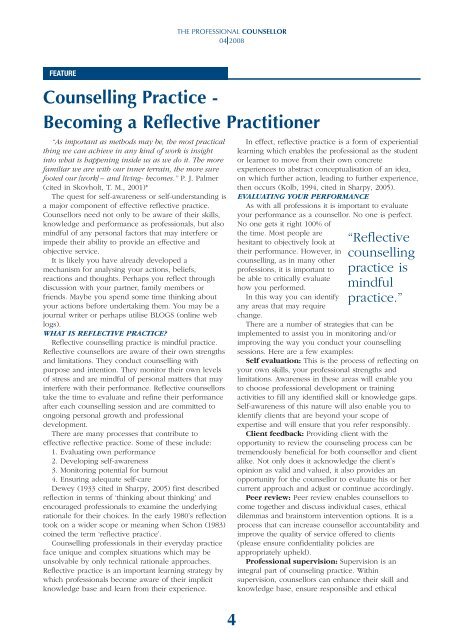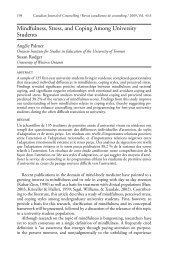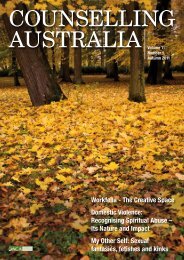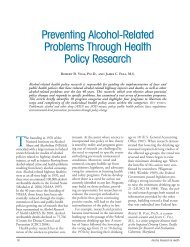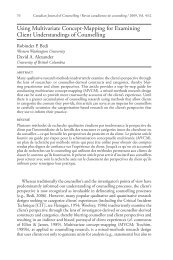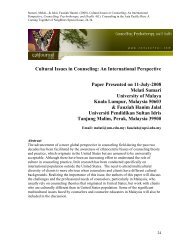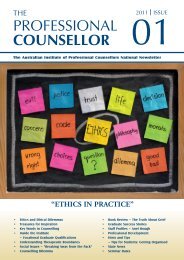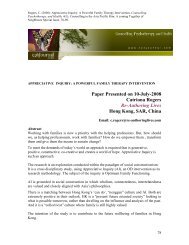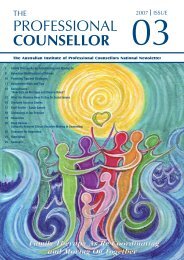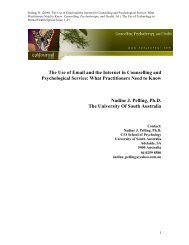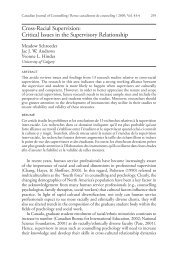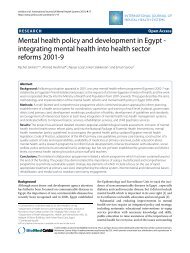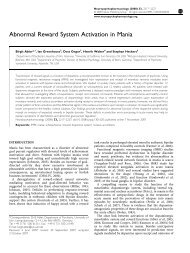Counselling Practice - Becoming a Reflective Practitioner
Counselling Practice - Becoming a Reflective Practitioner
Counselling Practice - Becoming a Reflective Practitioner
You also want an ePaper? Increase the reach of your titles
YUMPU automatically turns print PDFs into web optimized ePapers that Google loves.
THE PROFESSIONAL COUNSELLOR<br />
04 2008<br />
FEATURE<br />
<strong>Counselling</strong> <strong>Practice</strong> -<br />
<strong>Becoming</strong> a <strong>Reflective</strong> <strong>Practitioner</strong><br />
“As important as methods may be, the most practical<br />
thing we can achieve in any kind of work is insight<br />
into what is happening inside us as we do it. The more<br />
familiar we are with our inner terrain, the more sure<br />
footed our [work] – and living- becomes.” P. J. Palmer<br />
(cited in Skovholt, T. M., 2001)*<br />
The quest for self-awareness or self-understanding is<br />
a major component of effective reflective practice.<br />
Counsellors need not only to be aware of their skills,<br />
knowledge and performance as professionals, but also<br />
mindful of any personal factors that may interfere or<br />
impede their ability to provide an effective and<br />
objective service.<br />
It is likely you have already developed a<br />
mechanism for analysing your actions, beliefs,<br />
reactions and thoughts. Perhaps you reflect through<br />
discussion with your partner, family members or<br />
friends. Maybe you spend some time thinking about<br />
your actions before undertaking them. You may be a<br />
journal writer or perhaps utilise BLOGS (online web<br />
logs).<br />
WHAT IS REFLECTIVE PRACTICE<br />
<strong>Reflective</strong> counselling practice is mindful practice.<br />
<strong>Reflective</strong> counsellors are aware of their own strengths<br />
and limitations. They conduct counselling with<br />
purpose and intention. They monitor their own levels<br />
of stress and are mindful of personal matters that may<br />
interfere with their performance. <strong>Reflective</strong> counsellors<br />
take the time to evaluate and refine their performance<br />
after each counselling session and are committed to<br />
ongoing personal growth and professional<br />
development.<br />
There are many processes that contribute to<br />
effective reflective practice. Some of these include:<br />
1. Evaluating own performance<br />
2. Developing self-awareness<br />
3. Monitoring potential for burnout<br />
4. Ensuring adequate self-care<br />
Dewey (1933 cited in Sharpy, 2005) first described<br />
reflection in terms of ‘thinking about thinking’ and<br />
encouraged professionals to examine the underlying<br />
rationale for their choices. In the early 1980’s reflection<br />
took on a wider scope or meaning when Schon (1983)<br />
coined the term ‘reflective practice’.<br />
<strong>Counselling</strong> professionals in their everyday practice<br />
face unique and complex situations which may be<br />
unsolvable by only technical rationale approaches.<br />
<strong>Reflective</strong> practice is an important learning strategy by<br />
which professionals become aware of their implicit<br />
knowledge base and learn from their experience.<br />
In effect, reflective practice is a form of experiential<br />
learning which enables the professional as the student<br />
or learner to move from their own concrete<br />
experiences to abstract conceptualisation of an idea,<br />
on which further action, leading to further experience,<br />
then occurs (Kolb, 1994, cited in Sharpy, 2005).<br />
EVALUATING YOUR PERFORMANCE<br />
As with all professions it is important to evaluate<br />
your performance as a counsellor. No one is perfect.<br />
No one gets it right 100% of<br />
the time. Most people are<br />
hesitant to objectively look at<br />
their performance. However, in<br />
counselling, as in many other<br />
professions, it is important to<br />
be able to critically evaluate<br />
how you performed.<br />
In this way you can identify<br />
any areas that may require<br />
change.<br />
“<strong>Reflective</strong><br />
counselling<br />
practice is<br />
mindful<br />
practice.”<br />
There are a number of strategies that can be<br />
implemented to assist you in monitoring and/or<br />
improving the way you conduct your counselling<br />
sessions. Here are a few examples:<br />
Self evaluation: This is the process of reflecting on<br />
your own skills, your professional strengths and<br />
limitations. Awareness in these areas will enable you<br />
to choose professional development or training<br />
activities to fill any identified skill or knowledge gaps.<br />
Self-awareness of this nature will also enable you to<br />
identify clients that are beyond your scope of<br />
expertise and will ensure that you refer responsibly.<br />
Client feedback: Providing client with the<br />
opportunity to review the counseling process can be<br />
tremendously beneficial for both counsellor and client<br />
alike. Not only does it acknowledge the client’s<br />
opinion as valid and valued, it also provides an<br />
opportunity for the counsellor to evaluate his or her<br />
current approach and adjust or continue accordingly.<br />
Peer review: Peer review enables counsellors to<br />
come together and discuss individual cases, ethical<br />
dilemmas and brainstorm intervention options. It is a<br />
process that can increase counsellor accountability and<br />
improve the quality of service offered to clients<br />
(please ensure confidentiality policies are<br />
appropriately upheld).<br />
Professional supervision: Supervision is an<br />
integral part of counseling practice. Within<br />
supervision, counsellors can enhance their skill and<br />
knowledge base, ensure responsible and ethical<br />
4


